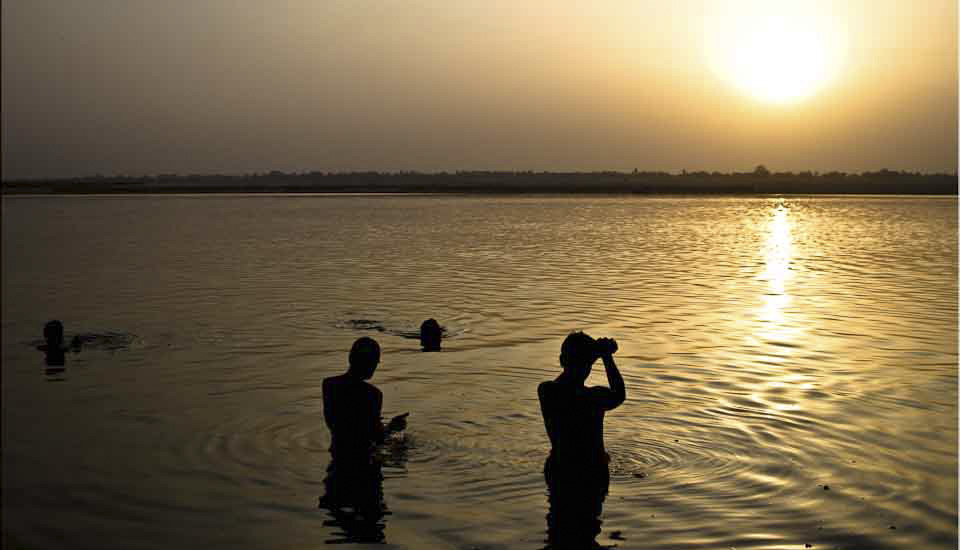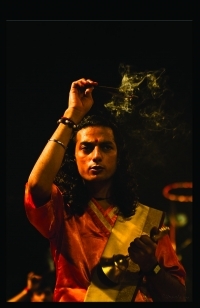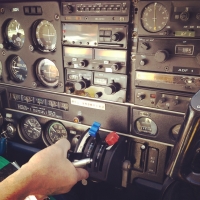.jpg)
Smoking Man
Dark eyes, facial tattoos, and a cheeky smile: how could I not make a portrait?
“Yuorait?” “Yu stap gut?”
The calls of “How are you?” in Papua New Guinea’s Tok-Pisin were all around us when we stopped at a simple roadside stall just outside Maprik in East Sepik Province. The local people who were gathered in the canopied shade – selling their produce, gossiping and chewing betel – seemed happy to see us, even though they must have known that we waitpela were unlikely to be in the market for any of the yams, taro, coconut, betel nut, ginger or greens on offer.
The market itself was nothing special: corrugated iron roofing on a simple wooden frame covering a flattened dirt floor. Vendors sat in clumps on plastic sheeting or woven mats, or gathered outside the shelter on logs or grassy patches. The produce for sale included the technically illegal and carcinogenic betel nut palm seeds (Areca catechu): that ubiquitous chew that contributes to dental problems and receding gums, and is in evidence all around the country in the gap-toothed and stained smiles that greet visitors.
The local staples of taro, banana, ginger and sweet potato were also in evidence. This is the region of the Abelam people, known for their yam cult: where the men grow huge yams for special ceremonies. The ones we saw in the market were of the more mundane variety, grown only for food.
My attention, though, was on the people. They met me with a direct, unselfconscious gaze that says “I belong here.” That gaze came with open, betel-stained smiles that said, “You are welcome to visit – and to photograph.”
So I did.
These are the moments I enjoy most when travelling: when – even without a language in common – there is a sense of communion between our eyes and across the camera.
You, too, are welcome.
.jpg)
Men in the Road
It may be the Sepik Highway, but like most of the roads in Papua New Guinea – when they exist at all – the main road from Wewak to Pagwi is rough, with its shoulders falling away. These men were off to Sunday church choir practice at a nearby school.
.jpg)
Selling Vegetables
The “market” itself is a corrugated iron roof over a flat dirt floor.

Market Yams, Taro and Ginger
Some of the vendors use plastic sheeting to display their produce.

Child Selling Cigarettes, Areca Catechu and “Snax”
It is not uncommon to see children put to work. It is alarming, however, when they are selling tobacco, betel nut, and junk food.

Snacking Girl
Of course, selling things is less arduous when you can snack during your shift.

“Have Some Mango!”
It is dark under the market roof, but it is not cool. I can’t help but marvel that Grannie feels the need to wear a hat!

Toddlers
Young children are always impossible to resist!

Chewing Areca Catechu
I find it hard to watch people with their mouths over-full with betel nut chew. I think this young man sensed that, and delighted in showing off.

Mother and Child
An infant clings to mum, …

Curious Infant
… but braves a look at me over her shoulder.

Women at the Roadstop

Tattooed Faces
The smudgy, faded tattoos on people’s foreheads and cheeks didn’t seem to follow a set design. I was told they were “just patterns”. In the old days, tribal tattooing was more extensive and took prescribed forms.

Smoking Woman
A woman, with her colourful bilum – a traditional woven string bag – at her feet, …

Smoking Woman
… enjoys her smoke. Tailor made cigarettes, self-rolled tobacco, and cheroots are everywhere.

Tattooed Betel-Chewing Woman
Tobacco is also often combined with betel nuts as a chewing mixture.

Portrait in Purple
Even with the clear betel-damage, …

Portrait in Purple
… these people have beautiful smiles.

Woman in Braids

Photographers
The down-side of traveling with a group of photographers is that they can all “clump” in one or two spots! I was on a Jim Cline tour with photographer Karl Grobl.

Maprik Buildings
I decided to escape the pack, and wander behind the market where I found a cluster of traditional thatched huts and fibrocement houses.

Young Person
There too, I found people willing to be photographed.

Young Woman

Woman in Front of her House

Young Man
One of the last pictures I took at this stop was of the big smile of the young man who opened this set.
I returned to our bus in good spirits.
 It is hard not to feel happy when you have been so warmly welcomed.
It is hard not to feel happy when you have been so warmly welcomed.
Until next time,
Keep Smiling!
Photographs: 13August2017



























.png)


I love these pictures. I have a couple that are similar, but you have so many! They really flesh out the story.
How are you?
Hi Diane,
Thanks so much, Diane! Glad to see you on line, and hope you are well.
We are “All at Sea” at the moment – off the coast of Spain and loving it!
Cheers, U
Nice Photos
Thanks, Peter!
[…] Hagen, and take three hours.) The next day, we rode a bumpy bus for five hours (with stops; see: Maprik Market Portraits) to Pagwi before getting into motorised dugout boats for a leisurely two-hour trip up the […]
[…] to get one of the few direct flights to Wewak. From there, it was a long, bumpy bus ride (see: Maprik Market Portraits) to Pagwi. The next leg of the journey was a leisurely two-hour trip up the mighty Sepik River in a […]